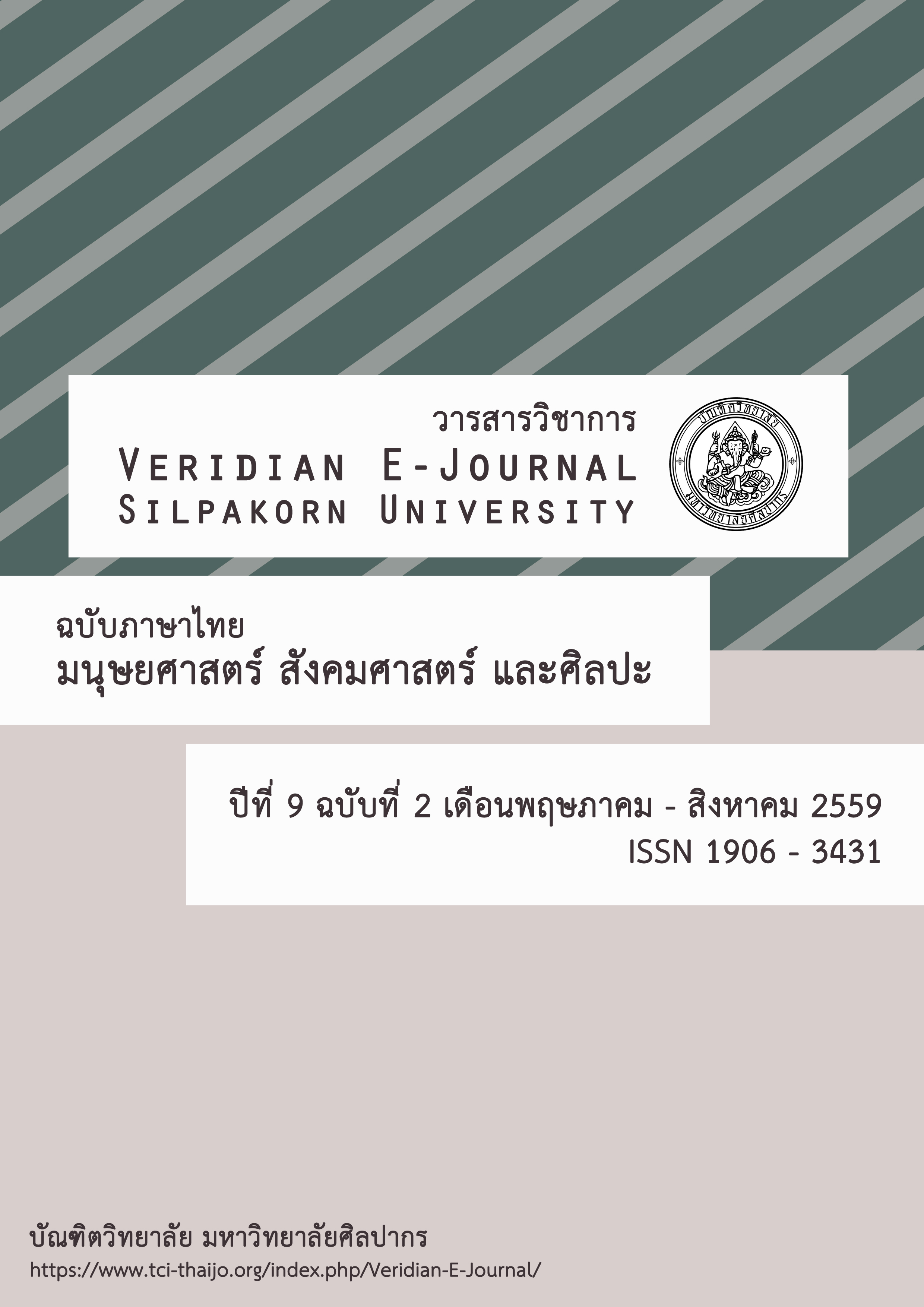การเปรียบเทียบพฤติกรรมการออมกับการบริหารการเงินก่อนเกษียณอายุ กรณีศึกษาบุคลากรมหาวิทยาลัยศิลปากร วิทยาเขตพระราชวังสนามจันทร์
Main Article Content
Abstract
การวิจัยครั้งนี้มีวัตถุประสงค์เพื่อศึกษาความสัมพันธ์ระหว่างปัจจัยส่วนบุคคลกับปัจจัยพฤติกรรมการออมเงินก่อนเกษียณอายุของบุคลากรมหาวิทยาลัยศิลปากร วิทยาเขตพระราชวังสนามจันทร์กลุ่มตัวอย่างที่ใช้ในการวิจัย คือ บุคลากรมหาวิทยาลัยศิลปากร วิทยาเขตพระราชวังสนามจันทร์ จำนวน 327 คน ใช้วิธีการสุ่มตัวอย่างแบบแบ่งชั้นภูมิ เครื่องมือที่ใช้ในการวิจัย คือ แบบสอบถามพฤติกรรมการออมและการบริหารการเงินก่อนเกษียณอายุ ตรวจสอบความเที่ยงตรงเชิงเนื้อหามีค่าดัชนีความสอดคล้องเท่ากับ 1.00 และมีค่าความเชื่อมั่นทั้งฉบับเท่ากับ 0.93 วิเคราะห์ข้อมูลโดยใช้การทดสอบไคร์สแควร์ (Chi-Square) T-test และ F-test (ANOVA)
ผลการวิจัยพบว่า
1. ข้อมูลส่วนบุคคล ได้แก่ เพศ อายุ สถานภาพ ระดับการศึกษาสูงสุด จำนวนสมาชิกในครอบครัว จำนวนบุตร บุคคลที่อยู่ในความรับผิดชอบ ประเภทของบุคลากร หน่วยงานที่สังกัด รายได้ต่อเดือนและรายจ่ายต่อเดือนมีความสัมพันธ์ต่อพฤติกรรมการออม
2. ข้อมูลส่วนบุคคล ได้แก่ สถานภาพ ระดับการศึกษา จำนวนสมาชิกในครอบครัว ประเภทของบุคลากร หน่วยงานที่สังกัด รายได้ต่อเดือนที่แตกต่างกันส่งผลต่อการบริหารการเงินแตกต่างกัน ส่วนข้อมูลส่วนบุคคลในด้านเพศ อายุ จำนวนบุตร บุคคลที่อยู่ในความรับผิดชอบและรายจ่ายต่อเดือนที่แตกต่างกันส่งผลต่อการบริหารการเงินไม่แตกต่างกัน
3. พฤติกรรมการออม ได้แก่ อัตราการออม ลักษณะการออม วัตถุประสงค์ในการออม การเลือกรูปแบบการออม ระยะเวลาในการเก็บออม แหล่งข้อมูลในการเก็บออมและการวางแผนการออมเพื่อการเกษียณที่แตกต่างกันมีการบริหารการเงินแตกต่างกัน ยกเว้นพฤติกรรมการออมด้านแนวโน้มการออมเงินในอนาคตที่แตกต่างกันมีการบริหารการเงินไม่แตกต่างกัน
The purpose of this research is to study the savings behavior and financial management before retirement of the sample group in Silpakorn University, Sanamchan campus. The sample group used in this research is 327 staffs in the Silpakorn University, Sanamchan campus chosen by the stratified random sampling. The thesis instrument is the questionnaire asking on their savings behavior and financial management before the retirement, for which the questionnaire is all examined in the content validity. The index of item-objective congruence (IOC) equals to 1.00 and the reliability is 0.93. The analysis of data uses the Chi-Square testing, T-test and F-test (ANOVA)
The research result finds that
1. Personal information including gender, age, marital status, highest education level, number of family members, number of children, person in his responsibility, type of the personnel job, original affiliation, monthly income and monthly expenses relates to the saving behavior before the retirement
2. Personal information including marital status, highest education level, number of family members, type of the personnel job, original affiliation, and monthly income have the impact on financial management. While, personal information including gender, ages, number of children, person in his responsibility, and monthly expenses do not have an impact on the financial management.
3. Savings behavior including saving rate, savings characteristics, purpose of savings, forms of savings, savings period, and sources of savings information have the impact on financial management. While, savings behavior of the tendency to future savings do not have an impact on the financial management.

